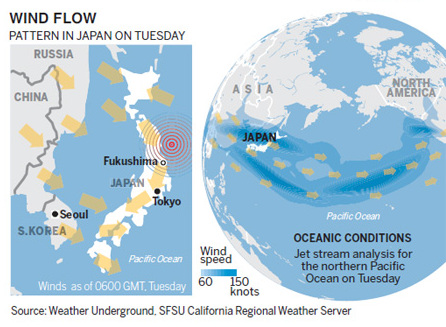Could nuclear cloud cross Pacific Ocean?
Winds are dispersing radioactive material from Japan's quake-hit Fukushima Daiichi nuclear power plant over the Pacific Ocean, away from Japan and other Asian countries, the World Meteorological Organization (WMO) said on Tuesday.

But the United Nations agency warned that although winds had blown particles offshore so far, weather conditions could change and it was closely monitoring satellite and other data.
"At this point, all the meteorological conditions are offshore so there are no implications for Japan or other countries near Japan," Maryam Golnaraghi, chief of WMO's disaster risk reduction division, told a briefing in Geneva.
An explosion at the quake-hit nuclear power plant sent out low levels of radiation, prompting some people to flee the capital Tokyo and others to stock up on essential supplies.
The WMO's assessment was based on models derived from data from three meteorological agencies in Japan, China and Russia, as well as other information, WMO spokeswoman Clare Nullis said.
"So far they have been mainly offshore. That is, the winds have been dispersing materials introduced into the atmosphere to the open ocean," Golnaraghi said.
"However, meteorological systems develop and progress," Golnaraghi added.
Winds on Tuesday and Wednesday in the stricken area would mainly blow toward the northeast and east, but on Wednesday if particles are released in the lower levels of the atmosphere, "they will be westerly, they will be toward inland (Japan)", she said.
"So what it means is that depending on the concentration of the particles and depending on which level of the atmosphere they are issued, they could be taking a very different trajectory," Golnaraghi added.
California waits
California is closely watching the crisis, but officials downplayed the threat that a radioactive cloud blown across the Pacific could pose for the US west coast.
While radioactivity could reach the United States from the quake-hit Fukushima plant, the levels would not be high enough to cause major health problems, said the Nuclear Regulatory Commission (NRC).
Some experts disagreed, notably pointing to the west-east jet stream, but the NRC - which was asked by Japan on Monday to send nuclear experts to deal with the crisis - said even the Pacific island state of Hawaii faced little risk.
"Right now it's quite possible that there could be some radiation floating over the United States. But we don't think that it would be particularly harmful ... even in a worst-case scenario," spokesman David McIntyre said.
The comments came as Japanese authorities grappled with multiple crises at the nuclear plant, 250 km north of Tokyo, following Friday's magnitude-9 quake and tsunami in northeastern Japan.
A third huge explosion rocked the plant on Tuesday, while a spokesman said there appeared to be damage to the structure around the number-two reactor, while higher radiation levels were reported between Fukushima and Tokyo.
California's Department of Public Health said it is "monitoring the situation closely", and highlights its Nuclear Emergency Response Program, which sets out measures to be taken in case of a nuclear incident.
 0
0 






